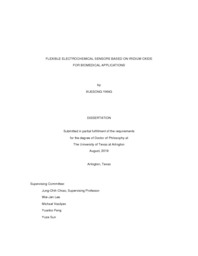| dc.description.abstract | Considering the disadvantages of the costly, laborious, and time-consuming traditional clinical analyses, there is a tendency of developing non-hospital point-of-care which allows patients to monitor their health conditions conveniently at home. To optimize the convenience of the point-of-care instruments, a wearable device with the ability of detecting different biological components in different biological conditions is preferer. The device should also have the qualities of rapid analyses, high accuracy, and high sensitivity. To accomplish these requirements, we proposed a flexible electrochemical sensor based on iridium oxide (IrOx). As a noble metal, iridium oxide has the advantages of bio-compatible, stable, and corrosive resistance in electrolyte solutions. It also has a wide-pH sensing range, which makes it perfect material for biological conditions monitoring. Our IrOx-based sensor provides instantaneous and continuous response with high spatial and temporal resolutions. It also has the advantages of excellent flexibility, simplicity in fabrication, cost effectiveness, and low power consumption which makes it suitable for wireless data transduction. In the meanwhile, our IrOx-based sensor shows reliable performance when tested in biomimetic environment for various bio-applications.
Lactate detection by an in-situ sensor is of great need in clinical medicine, food processing, and athletic performance monitoring. In this work, we present a flexible, easy to fabricate, and low-cost biosensor base on IrOx. The sensor is characterized by the scanning electron microscopy (SEM) and the cyclic voltammetry (CV). The flexibility, durability, sensibility, and selectivity of the sensor were examined. The sensor shows an average surface area normalized sensitivity of 9.25 µA/(cm2 mM) with a life time of 4 weeks. It shows little response to interference chemicals, such as glutamate and dopamine.
pH is a crucial indicator in various biological conditions. Since many biological reactions are pH dependent, a responsive pH sensor adaptable to various mechanical environments is desired owning to its capability of providing real time monitoring of the reaction status. In this work, we conduct in-depth study of the performance of the IrOx-based pH sensor. The factors which could influence the performance of the pH sensor have been investigated. Various pH sensors are fabricated with different IrOx deposition techniques, different metal substrates and adhesion layers, and different sizes of the sensing area. The SEM and electron dispersive analysis (EDAX) are conducted to evaluate the physical condition and quality of the IrOx sensing films before and after used in acidic/ alkaline environment. The pH sensors are evaluated for the sensitivity, potential fluctuation, potential deviation, potential drift, hysteresis effect, interference effect, and effective pH detection ranges.
To evaluate the feasibility of utilizing our IrOx-based sensors in real-life, experiments are conducted to check the performance of the sensors for various biomimetic applications. Firstly, an ultra-flexible IrOx-based pH sensor with robust performance and simple fabrication processes is fabricated for skin test. The pH sensor is tested in flat and deformed conditions with a mechanical apparatus. A promising sensitivity of 49.3 mV/pH in the pH range between 2 and 13 at the room temperature is obtained in both scenarios. When attached to skin, the pH sensor shows excellent conformity with reliable pH response. The response time, stability, reversibility, and repeatability of the sensor are investigated in both types of physical settings. Comparing with a commercial sensor, our sensor has the advantages of smaller size, faster responding time, and better accuracy in the testing environment with insufficient liquids. Secondly, an integrated IrOx-based sensor-array is fabricated for sweat measurement. Sweat is one of the body fluids that can be obtained non-invasively and easily. Real-time monitoring of sweat can provide immediate information about body chemistry. In this study, our multi-functional sensor-array is capable of detecting lactate concentration, sodium ion concentration, and pH level of the sweat, with excellent sensitivity, reversibility, and stability. The advantages of good conformity, low fabrication cost, and noninvasiveness make our flexible IrOx-based sensor-array a promising diagnostic tool for sweat analysis. | |


